Beijing Institute of Technology in the Global Arena
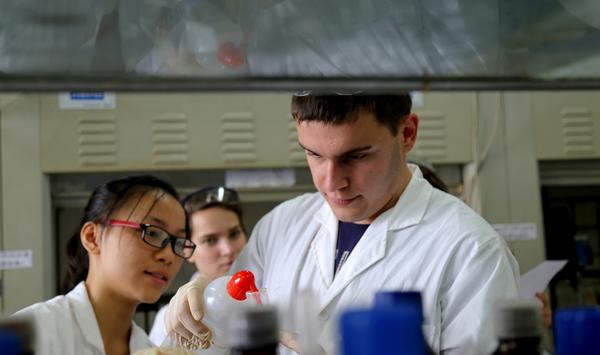
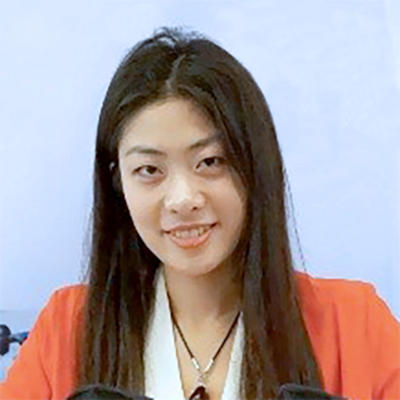
Jiapei SHEN currently works in the Office of International Students, Beijing Institute of Technology (BIT). She got her Master degree in Psychology of Education in the University of Manchester in 2012. She is in charge of international cooperation, international students’ administration and students’ cross culture training in BIT.
Beijing Institute of Technology (BIT) was established in 1940 and began to recruit foreign students in 1995. Beijing Institute of Technology is a public university with a traditional focus on science and technology, but developing into other areas such as management and humanities. The Institute emphasizes ethics in scholarship, discovery of truth, and contribution to mankind through profound academic accomplishments. Presently BIT has over 2,100 foreign students from more than one hundred different countries, like South Korea, Germany, Pakistan, Indonesia, Poland, and Mexico. The students are distributed in various programs such as Mechanical Engineering, Computer Science and Technology, Control Science and Electrical Engineering, Automation Engineering, Information and Communication Engineering, Aeronautics & Space Science and Technology, Design and Arts, and other major engineering fields.
BIT’s Mission
Vision—A university with distinctive programs and global influence.
Mission—BIT is dedicated to developing lofty ideals and sound scholarship, a strong body and a quiet heart; evolving a pragmatic and humble spirit, and creating a culture of excellence; improving research capabilities, and achieving distinction in defense technology.

Prof. Hu Haiyan has served as President of Beijing Institute of Technology (BIT) since 2007. Before his current appointment at BIT, he worked as President of Nanjing University of Aeronautics and Astronautics (NUAA) from 2001 to 2007, and Vice President of NUAA from 1998 to 2001. He was Humboldt Research Fellow at University of Stuttgart, Germany, and Visiting Professor at Duke University, USA, in the early 1990’s. Prof. Hu is a world renowned scientist in the fields of computational and nonlinear dynamics, with a great variety of applications to the autonomous assembly, deployment and thermal dynamics of space structures, the active flutter suppression of aircraft structures, dynamics and control of tethered satellites. Prof. Hu holds a number of academic positions that mainly include: Member of Presidium of the Chinese Academy of Sciences, Member of the General Assembly of the International Union of Theoretical and Applied Mechanics, Associate Editor of the ASME Journal of Computational and Nonlinear Dynamics and of the International Journal of Nonlinear Dynamics and Control, Member of the Editorial Board of six international journals, including the International Journal of Non-Linear Mechanics, and the Journal of Sound and Vibration.
Brief history
BIT was founded in 1940 in Yan’an, Shaanxi Province and was relocated to Beijing in 1949. The following year, the main campus and the Departments of Maths, Physics and Chemistry of the Institut Franco-Chinois were merged with BIT.
BIT has always formulated its strategies in the light of national strategic needs and global developments in science and technology and education, and in accordance with its own strengths and missions. These strategies include consolidating its strengths in mechanical and vehicle engineering and automation; leveraging its advantages and distinctive programs in IT-related disciplines; and developing new strengths in aerospace engineering. BIT will build its strengths in both science and engineering, and simultaneously develop disciplines in management and humanities.
Technological achievements
BIT’s success story of technological advances started in 1958, when a number of projects and products developed by the Institute were launched. All of them were novel for China of that time. They are the first in China low-angle height finding radar, sounding rocket, planetarium, and TV system.

Pure electric buses (2008).
The latest BIT’s projects are associated with major national events. Pure electric buses, firework technology and software simulation technology contributed to the success of the 2008 Beijing Olympics, the 2010 Shanghai Expo and the 2010 Guangzhou Asian Games.
Another record page of BIT’s achievements is astronomic. It concerns deployment simulation of the communication antenna for Lunar Orbitor Chang’e I and a dynamic analysis of a satellite dual-axis antenna. BIT researchers designed the signal processing system for unmanned docking of the Shenzhou VIII spacecraft with the Tiangong I space module. BIT Lab of Space Biology studies microfluidic chips to explore traces of life in space via space biological and biomedical experiments. The Shenzhou VIII spacecraft has taken a life science research device designed by BIT to carry out experiments in space.
BIT researchers and designers work in different spheres contributing to the development of cutting-edge technologies. The BIT Laser Micro/Nano-Fabrication Laboratory developed the fs/ps laser 3D micro/nano-fabrication system, ultra-long lifetime ultra-high energy-density batteries and novel high-sensitivity fiber sensors. The first wireless humanoid robot designed by BIT can walk and perform tai chi. The latest robots can play ping-pong against humans. Aiming to improve the energy density, power density, safety problems of secondary batteries, as well as the green recycling of used batteries, BIT researchers have made systematic research into power batteries: Ni-H (>1250W/kg) and lithium (>1800W/kg). The batteries have been applied to hybrid-electric vehicles produced by major Chinese automotive manufacturers. The virtual reality technology developed by BIT enables people to see the “real” Yuan-Ming Park destroyed in several wars.
Beijing Institute of Technology today
BIT has four faculties—the Faculty of Mechanical and Transportation Engineering, the Faculty of Information and Electronics, the Faculty of Natural Sciences and Materials, the Faculty of Humanities and Social Sciences—with 20 colleges, as well as the Institute of Educational Research, School of Liberal Arts, School of Continuing Education, School of International Education and Higher Vocational and Technical College, and numerous advanced science research centers.
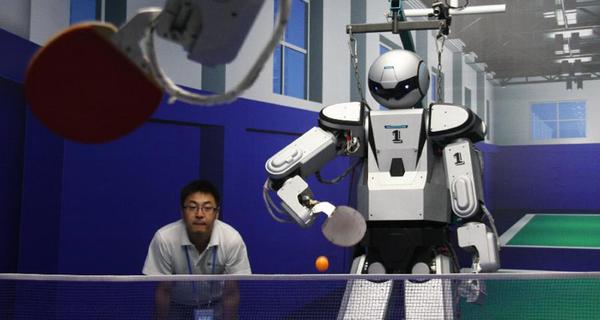
Humanoid robots can distinguish high-speed objects and make dynamic balance. In the picture two robots are playing table tennis with each other.
BIT comprises more than 3,500 faculty members and more than 28,000 full-time students. Over 14,000 are undergraduate students, nearly 8,000 are graduate students and over 3,000 are doctoral students.
Engineering, materials science, chemistry, physics and mathematics are the five disciplines in BIT that are ranked among the top 1% in the Essential Science Indicators (ESI) global ranking. Over the years, BIT is devoted to improving its research capabilities. High-level achievements have been made in navigation control, injury prevention and safety, mechanical and vehicle engineering, materials science, and information systems and warfare. It has developed a clear edge in technologies relating to intelligent and bionic robotics, space adaptive optics, green energy, modern communications and industrial process control.
International cooperation
By taking a global approach to education, BIT is increasingly becoming an internationally reputable and influential institution. Currently, it has established inter-university collaboration with more than 240 renowned universities in 71 countries and regions on six continents; it was the lead founder of the Sino-Spanish University Consortium and the Sino-Russian-Belarussian University Consortium and the co-founder of two Confucius Institutes: Confucius Institute of University of Lagos in Nigeria and Confucius Institute of University of Saskatchewan in Canada. BIT is building an international university, and has created a global network for exchange and cooperation.
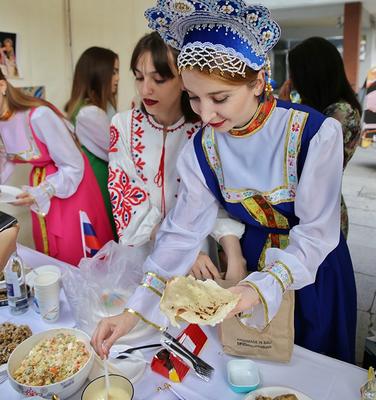
The International Culture Festival.
BIT pays special consideration to the growth of each student and promote the development and improvement of the educational system for international students. At present, all the courses taught in Chinese are eligible to recruit foreign students. Presently BIT offers six undergraduate and 11 graduate programs in English. The PhD studies are completely conducted in the English language. The educational system of Beijing Institute of Technology holds a special advantage, not only nationally but internationally, due to its long and historic background in engineering and long-term overseas educational collaborations. At the same time, the Institute have also initiated numerous short-term programs, like overseas exchange programs, language and cultural exchange programs, short-term technical exchange student programs, etc.
Undergraduate Programs in English:
- Computer Science and Technology,
- Mechanical Engineering,
- Electronic Science and Technology,
- Electrical Engineering,
- Mechatronics Engineering,
- International Economics and Trade
Master Programs in English:
- Aeronautics & Space Science and Technology,
- Chemistry,
- Chemical Engineering and Technology,
- Computer Science and Technology,
- Control Science and Engineering,
- Electronics Science and Technology,
- Information and Communication Engineering,
- Law,
- Mechanical Engineering,
- Software Engineering,
- MBA
*All PhD programs can be taught in English.
Recent News
Xi Jinping and Vladimir Putin sent messages of congratulation for the opening ceremony of Shenzhen MSU-BIT University

In his congratulations, Xi Jinping pointed out that education is an important driving force for national development and progress and an important link for promoting exchanges and cooperation between people of all countries. In recent years, the Sino-Russian educational cooperation has been developing in depth, and the exchanges between the two countries have become more closely. All this has played a positive role in enhancing mutual understanding and friendship between the two countries and promoting the high level of China-Russia comprehensive strategic cooperative partnership. Sino-Russian co-founded Shenzhen MSU-BIT University is an important consensus reached by the leaders of the nations and also an important achievement of the in-depth development of humanitarian cooperation between the two countries, and it will have demonstrative value.
Xi Jinping hoped that Chinese and Russian education authorities and educators can take their respective advantages, increase the potential for cooperation to speed up the improvement of Shenzhen MSU-BIT University, and strive to build high-level universities and train high-quality talents to make contributions to development of educational cooperation and promotion of friendship between the two peoples.
Vladimir Putin said in his congratulations that educational cooperation has been an important part of Russia-China strategic partnership. The direct exchange of universities between the two countries has been expanding year by year, and the exchange practice of foreign students is becoming increasingly perfect. At the same time, middle school students have become the norm in each other’s national health camps. He believes that the Russian-Chinese University founded on the basis of two well-known universities will further enhance friendship and mutual understanding between the two peoples; and graduates from Shenzhen MSU-BIT University will be welcomed not only in Russia and China, but also worldwide.
The RF Minister of Education and Science on a visit in Beijing Institute of Technology
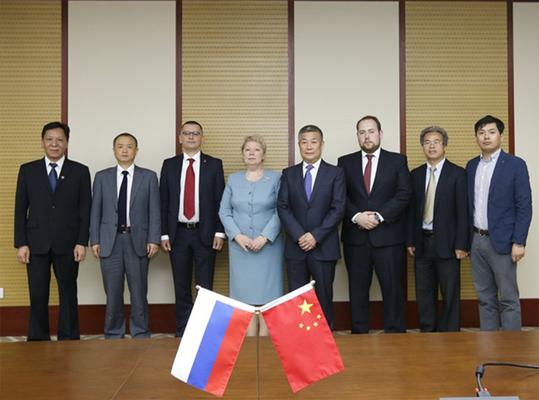
On May 15, 2017, Doctor Olga Vasileva, Minister of Education and Science of the Russian Federation, and her delegation visited Beijing Institute of Technology. During the visit they were accompanied by Li Hai, Deputy Director of the Department of International Cooperation and Exchange of the Ministry of Education of the People’s Republic of China. The Russian delegation included Kirill Chistiakov, Assistant of the RF Minister of Education and Science; Igor Pozdniakov, First Secretary of the Russian Embassy in China; and the Chinese representative of the Russian Ministry of Education and Science. Chairman of the BIT Council Zhao Changlu and Vice-President of BIT Mei Hong held a meeting with the guest delegation.